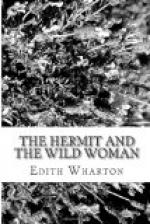In the lull after a speech, the gallery was fluttering with the rustle of programmes consulted, and Mrs. Sheff (the Brant girl’s aunt) leaned forward to say enthusiastically: “And now we’re to hear Mr. Ransom!”
A louder buzz rose from the table, and the heads (without relaxing their upward vigilance) seemed to merge, and flow together, like an attentive flood, toward the upper end of the horse-shoe, where all the threads of Margaret Ransom’s consciousness were suddenly drawn into what seemed a small speck, no more—a black speck that rose, hung in air, dissolved into gyrating gestures, became distended, enormous, preponderant—became her husband “speaking.”
“It’s the heat—” Margaret gasped, pressing her handkerchief to her whitening lips, and finding just strength enough left to push back farther into the shadow.
She felt a touch on her arm. “It is horrible—shall we go?” a voice suggested; and, “Yes, yes, let us go,” she whispered, feeling, with a great throb of relief, that to be the only possible, the only conceivable, solution. To sit and listen to her husband now—how could she ever have thought she could survive it? Luckily, under the lingering hubbub from below, his opening words were inaudible, and she had only to run the gauntlet of sympathetic feminine glances, shot after her between waving fans and programmes, as, guided by Guy Dawnish, she managed to reach the door. It was really so hot that even Mrs. Sheff was not much surprised—till long afterward. . . .
The winding staircase was empty, half dark and blessedly silent. In a committee room below Dawnish found the inevitable water jug, and filled a glass for her, while she leaned back, confronted only by a frowning college President in an emblazoned frame. The academic frown descended on her like an anathema when she rose and followed her companion out of the building.
Hamblin Hall stands at the end of the long green “Campus” with its sextuple line of elms—the boast and the singularity of Wentworth. A pale spring moon, rising above the dome of the University library at the opposite end of the elm-walk, diffused a pearly mildness in the sky, melted to thin haze the shadows of the trees, and turned to golden yellow the lights of the college windows. Against this soft suffusion of light the Library cupola assumed a Bramantesque grace, the white steeple of the congregational church became a campanile topped by a winged spirit, and the scant porticoes of the older halls the colonnades of classic temples.
“This is better—” Dawnish said, as they passed down the steps and under the shadow of the elms.
They moved on a little way in silence before he began again: “You’re too tired to walk. Let us sit down a few minutes.”
Her feet, in truth, were leaden, and not far off a group of park benches, encircling the pedestal of a patriot in bronze, invited them to rest. But Dawnish was guiding her toward a lateral path which bent, through shrubberies, toward a strip of turf between two of the buildings.




